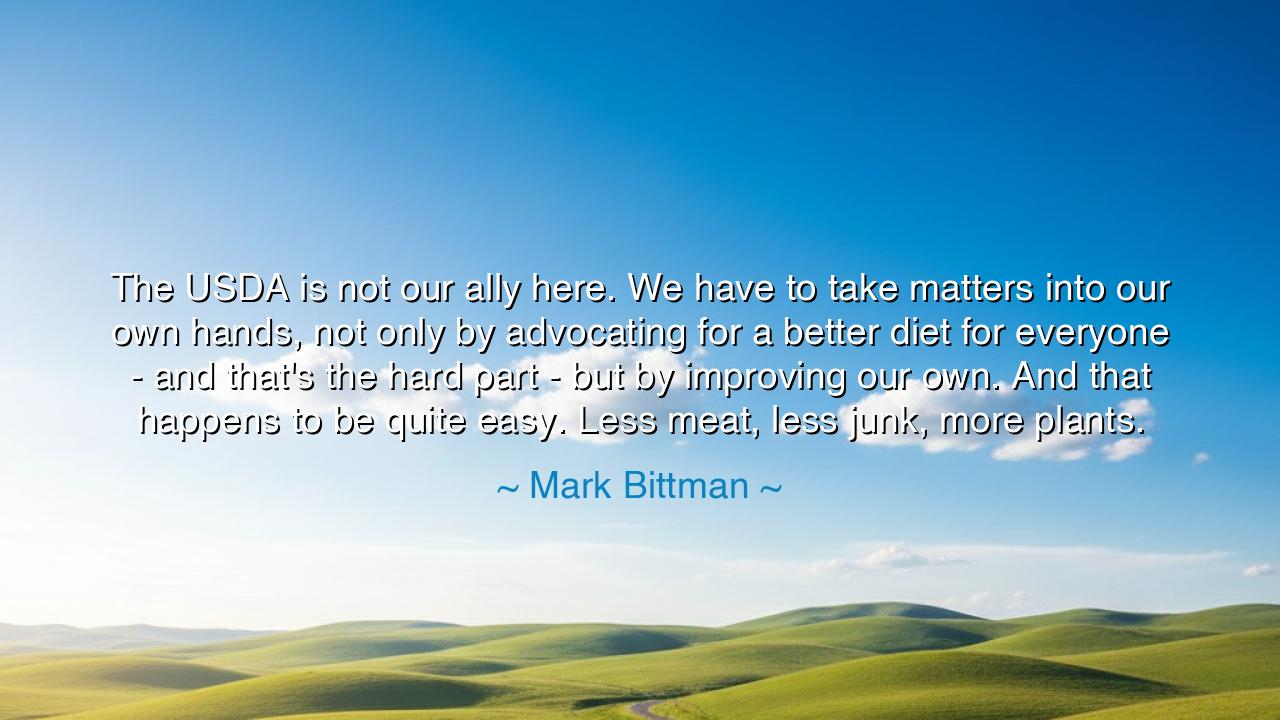
The USDA is not our ally here. We have to take matters into our
The USDA is not our ally here. We have to take matters into our own hands, not only by advocating for a better diet for everyone - and that's the hard part - but by improving our own. And that happens to be quite easy. Less meat, less junk, more plants.






When Mark Bittman declared, “The USDA is not our ally here. We have to take matters into our own hands, not only by advocating for a better diet for everyone—and that’s the hard part—but by improving our own. And that happens to be quite easy. Less meat, less junk, more plants,” he was not merely speaking about nutrition; he was calling for a reawakening of personal sovereignty. His words echo the voice of an ancient reformer, urging humanity to cast aside blind dependence and return to the simple wisdom of self-governance. In them, we hear the spirit of the philosopher, the farmer, and the prophet—each reminding us that the strength of a society begins in the discipline of the individual.
The USDA, to which Bittman refers, symbolizes the institutions of power that have long guided what nations eat and, by extension, how they live. Yet he declares that such institutions are not our “ally.” Why? Because systems driven by politics and profit often betray health for convenience, and truth for indulgence. The ancients would have understood this well, for even in their time, the greatest philosophers warned against allowing the state to shape the soul. Socrates taught that no government, however wise, could make a man virtuous if he would not rule himself. In this same way, Bittman reminds us that the health of a people cannot be dictated—it must be chosen.
The heart of his message lies in responsibility—in the sacred duty of taking “matters into our own hands.” This phrase resounds like the teachings of the Stoics, who believed that freedom was not the absence of restraint, but mastery over one’s choices. To “advocate for a better diet for everyone” is noble, but to begin with one’s own habits—that is the true revolution. For how can one guide others to virtue or health if one’s own body is a temple in disrepair? The ancients built their strength not on commands from rulers, but on discipline, moderation, and mindfulness—virtues that Bittman now calls us to reclaim at the table.
When he speaks of the simple command, “Less meat, less junk, more plants,” he does not offer a diet; he offers a creed. The wisdom behind these few words mirrors the teachings of the philosopher Pythagoras, who urged his students toward simplicity in food so that the mind might remain clear and the spirit unburdened. For to eat wisely is to live wisely—to consume not for pleasure alone, but for purpose. The meat and “junk” symbolize the excesses of civilization, the appetites that cloud reason and enslave the will. The “plants” represent renewal, balance, and the return to harmony with nature. In Bittman’s simplicity lies an echo of the oldest truths: that the purest life is often the least complicated.
Consider the example of the Roman general Cincinnatus, who, after saving his city from war, returned to his small farm rather than seizing power. His greatness lay not in conquest, but in humility. He knew that the measure of a person is not their wealth or fame, but their discipline in the ordinary acts of life. So too, Bittman’s teaching invites us to see that transformation begins not in grand gestures, but in small, daily acts—choosing a meal that sustains rather than consumes, eating with awareness rather than addiction. The battlefield of modern life is not fought with swords, but with choices.
Yet Bittman’s tone carries not despair, but hope. He tells us that change “happens to be quite easy.” The ancients might have smiled at this, for they too believed that truth, once seen, is simple—even if the path to it is not. The body knows what it needs, as the earth knows how to heal itself when left undisturbed. What is hard is not the act of eating better, but the courage to break free from the habits and systems that keep us numb. His challenge, then, is not a burden but an invitation—to return to the natural order, to rediscover the freedom of simplicity.
Let this be the lesson we carry forward: no institution can save what the individual refuses to guard. The health of a nation begins in the choices made at its tables. To eat with intention is to live with intention. The way we feed our bodies is the way we feed our spirits and our society. As Mark Bittman reminds us, revolution need not roar—it can whisper, in every quiet act of care, in every meal chosen with love and conscience. So take up this sacred duty: eat less of what deadens, more of what nourishes, and remember that in reclaiming your own plate, you reclaim your power to shape the world.






AAdministratorAdministrator
Welcome, honored guests. Please leave a comment, we will respond soon